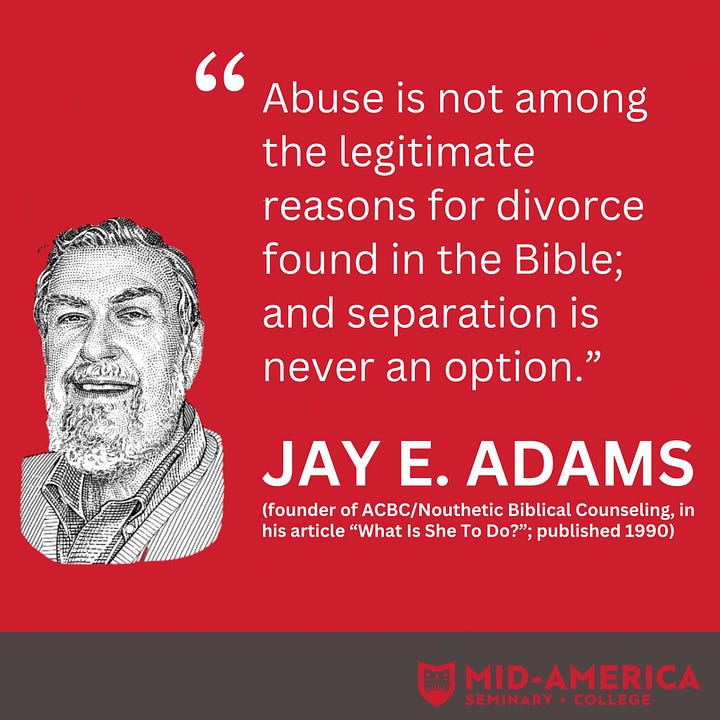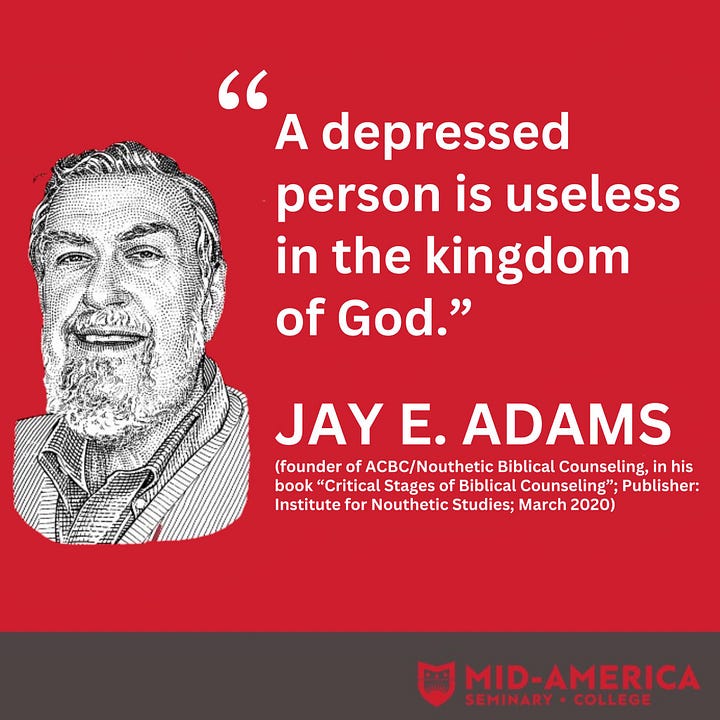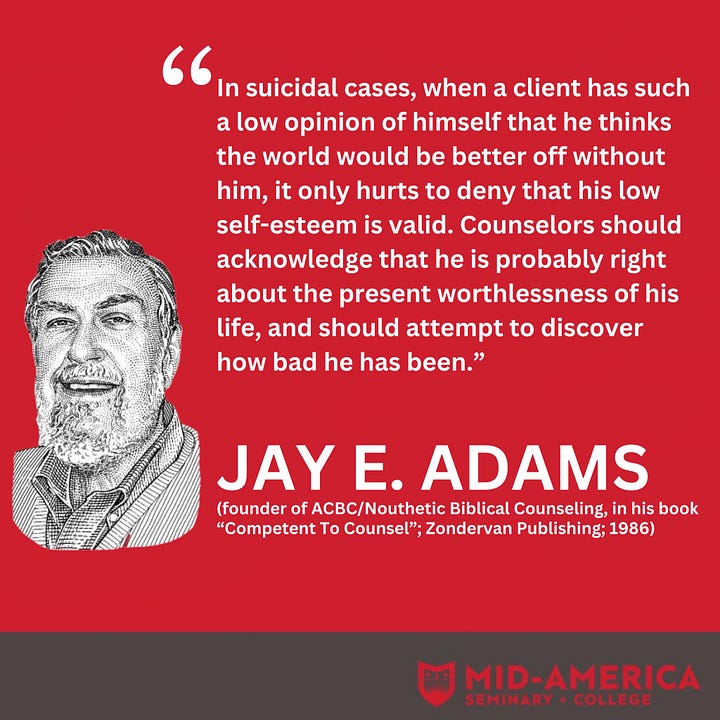Over the weekend, some guy on Twitter tried to recruit me to his wonky brand of “Christian” chauvinism by suggesting I read a book that, in his view, would illuminate some of my blind spots and inspire my agreement with his position.
What he didn’t know is that, not only have I read the book several times, but I’ve also completed the workshop, and its author is actually my personal therapist. Suffice to say, after multiple conversations with my therapist about this very topic, I can confidently say that Twitter dude is gravely mistaken. My opposition to chauvinism stands. It’s not something God sanctions. Thank heavens for that.
But the whole ordeal did open up a rather interesting sub thread about the merits of therapy. One woman, in particular, responded to me by saying that therapy is unbiblical because the Holy Spirit is supposed to be my counselor.
I obviously disagree with this assertion, but it’s a subject I think deserves some focused attention. In my experience, this is a widespread belief in way too many Christian communities—this notion that therapy or counseling is not only unhelpful but disobedient or even harmful. John MacArthur said it like this,
“Psychology is no more a science than the atheistic evolutionary theory upon which it is based. Like theistic evolution, ‘Christian psychology’ is an attempt to harmonize two inherently contradictory systems of thought. Modern psychology and the Bible cannot be blended without serious compromise to or utter abandonment of the principle of Scripture’s sufficiency.”
Both the Reformed and charismatic versions of this sentiment hinge on the same basic thesis with a minor difference: The Reformed camp says, “All you need is the Bible,” while the charismatic camp says, “All you need is the Holy Spirit.” In either situation, though, the suffering Christian is left with a pull-yourself-up-by-your-bootstraps theology that leaves them feeling guilty and inadequate for seeking help outside their own spiritual discipline. Not only are too many hurting people discouraged from seeking therapy, but they’re doubly shamed for even considering medication to help them balance out their chemicals.
There’s a certain arrogance or, at least, ignorance, that accompanies such counsel. Pastors, your familiarity with the Bible does NOT magically confer to you expertise in the workings of the human mind, neuropathways, complex trauma, etc. You are no more qualified, by virtue of your MDiv, to assert yourself as a therapist than you are to assert yourself as a brain surgeon. You haven’t done the work. Things like PTSD are literal brain injuries that ought to be treated by people who actually understand the way the brain is wired.
You are not going to cure chronic depression by assigning your congregant to read a book about pain by C.S. Lewis. And if your deliverance prayer session does not rid the poor woman of her belief that the government has planted a microchip under her skin, you aren’t doing anyone any favors by discouraging her use of medication.
Now I would be remiss if I failed to acknowledge the legitimacy of some of the reservations about modern day psychiatry. It’s objectively true that much of the field has been compromised by big pharma and other lobbyist groups. It’s not hard to understand why Christian people would be hesitant to send their loved ones into the care or guidance of people who boldly trumpet the bunk science of the gender cult, for example. No one should, in good conscience, throw their loved ones into the dens of self-declared wolves.
And I think that’s where Nouthetic Counseling came from. For those unfamiliar with the term, nouthetic counseling is basically a Christian attempt to bridge this gap. It’s a type of faith-based counseling based on biblical beliefs, doctrines and interpretations. Nouthetic counselors are given a formula for addressing peoples’ problems and aim to have them in and out of services within a period of 6-8 weeks. They are not formally trained or licensed in psychology in any capacity.
While it may be well-intended, I cringe when I hear people prescribing nouthetic counseling as any sort of solution. They should know that the entire model was founded by a Presbyterian minister named Jay Adams. Adams has zero training in psychology and some appalling public views on the very topics for which people need godly counsel in the first place. He believes, for example, that it’s possible for a girl to be complicit in her father’s choice to molest her. He believes that battered wives must remain married to their abusers. He believes that the self-hatred plaguing suicidal people is usually well-founded. Guys, this is no better than the secular counsel so many fear. (See this super helpful explanation and documentation of why nouthetic counseling is a bad idea.)




The truth is a lot more nuanced that “Psychology is great” or “Psychology is dangerous.” There’s good therapy, and there’s bad therapy. It can be life giving, or it can be an unmitigated disaster. As a 20+ year therapy veteran, here are a couple of things I think are important in establishing care with a mental health professional:
Make sure you and your therapist share a similar worldview. If you don’t, it’s going to play out like Tom Cruise’s relationship with Cher- you just won’t go together. My daughter needs therapy for pretty severe and sometimes debilitating hypochondria. (Yes, I did ask for her permission to share.) I need someone who’s trained in this area to help her navigate it. Finding a child psychologist is hard, especially if you don’t have great insurance. We were referred to a therapist who had massive gender pronoun posters on her wall. We did not continue services at this location. I was not willing to subject my child to the influence of a person who embraced such obvious lies. It just wasn’t going to be a good fit.
Make sure you can’t alpha your therapist. You need someone with a spine who’s not afraid to challenge your blind spots. You won’t learn or grow from someone who’s afraid of you. You won’t learn or grow from someone you don’t respect. You’re wasting money if you go to someone who always tells you exactly what you want to hear.
Don’t interpret all discomfort as a terrible thing. I tread lightly here, as discernment is needed, but change usually lives on the other side of discomfort. Therapy shouldn’t be easy. It’s supposed to invite you to wrestle pretty hard with the issues you would otherwise avoid. Give it a chance to do its thing.
If you’re looking for a therapist to help your gender dysphoric teen WITHOUT prescribing dishonest pronouns or hormones, it’s a really tall order, as many states are enacting bs laws that jeopardize the licenses of therapists who refuse to drink the trans koolaid. That said, this might be an isolated situation where a savvy layperson might be the best route. You might be better off finding a mentor or life coach you trust to come alongside your kid and speak life into him/her.
Therapy isn’t a substitute for personal spiritual work. It should supplement the work you’re already doing. Don’t stop praying. Don’t stop fighting for your miracle. Use therapy as a way to process the work you’re already doing.
Proverbs 11:14 says, “Where no counsel is, the people fall: but in the multitude of counselors there is safety.” There is no shame in asking for help. There is wisdom in seeking help from people who are actually qualified to give it. Shaming people out of therapy is wrong. I shudder to think how many, many suffering people have prolonged their suffering because of such counsel, white knuckling it through their trauma episodes and shaming themselves for not having enough faith.
This kind of teaching, ironically, creates the need for more therapy. Let’s not do that.





Oh, we Christians can put so many burdens on our brothers and sisters with the best of intentions! When I was diagnosed with cancer, I was shamed for going the chemo route. I should have prayed it away, they said. Well, here I am, 22 years later, my kids grown and gone. I don't dare tell them I'm on an antidepressant, that has changed my life. We live in a fallen world, and no one knows that better than God himself. That's why he gives us doctors, researchers, therapists, and plants with qualities that can heal.
Another excellent post. The repellent attitudes expressed in the quotes by Adams are still shockingly common. When Joshua Harris recanted his "I Kissed Dating Goodbye" and I read the comments people left on the website that collected such comments, it was the first time I realized that I wasn't the only kid to disclose sexual abuse to a pastor only to be required to pray for forgiveness for my "sin" of having sex outside of marriage. The notion that a theological education confers expertise into mental health issues is as widespread as it is dangerous. Sadly.